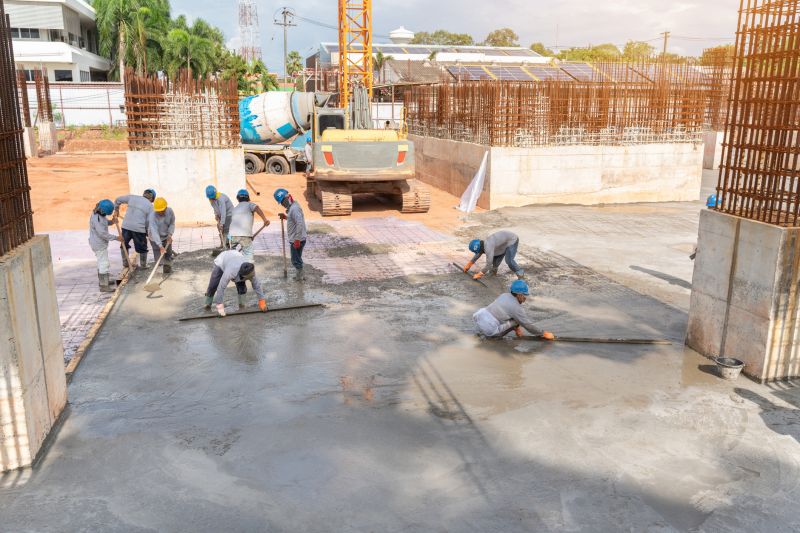Ultimate Product Selection For Concrete Installations To Simplify Projects
Discover a comprehensive range of supplies aimed at simplifying your concrete work while maintaining high standards.
 Concrete installations are fundamental to various construction and renovation projects, especially in locations like Honolulu, HI, where durability and weather resistance are vital. Selecting the right products ensures that concrete structures, whether for driveways, sidewalks, or decorative features, maintain their integrity over time. From adhesives and sealants to reinforcement materials, the array of available products caters to different needs and project scopes. Proper application and quality materials can help achieve professional results, even for DIY enthusiasts. Understanding the specific requirements of each project type can guide you toward the most suitable products for your concrete installation needs. In the humid and variable climate of Honolulu, choosing products that withstand moisture and temperature fluctuations is particularly important. Investing in reliable, high-quality materials can contribute to the longevity and safety of your concrete features.
Concrete installations are fundamental to various construction and renovation projects, especially in locations like Honolulu, HI, where durability and weather resistance are vital. Selecting the right products ensures that concrete structures, whether for driveways, sidewalks, or decorative features, maintain their integrity over time. From adhesives and sealants to reinforcement materials, the array of available products caters to different needs and project scopes. Proper application and quality materials can help achieve professional results, even for DIY enthusiasts. Understanding the specific requirements of each project type can guide you toward the most suitable products for your concrete installation needs. In the humid and variable climate of Honolulu, choosing products that withstand moisture and temperature fluctuations is particularly important. Investing in reliable, high-quality materials can contribute to the longevity and safety of your concrete features.
Top Overall Option
Concrete Bonding Adhesive
A versatile concrete bonding adhesive provides a strong, durable connection between new and existing concrete surfaces. It is suitable for patching, resurfacing, and extending concrete features, helping to ensure a cohesive and stable structure. When applied correctly, it can improve adhesion and reduce the risk of delamination or cracking. This type of product is widely used in various concrete repair and installation projects, making it a reliable choice for both professionals and DIYers in Honolulu, HI.
Types of Products For Concrete Installations
Concrete Sealants
Sealants protect concrete surfaces from moisture, staining, and surface damage, enhancing durability and appearance.
Concrete Curing Compounds
Curing compounds help retain moisture in freshly poured concrete, promoting proper hydration and strength development.
Reinforcing Steel Bars
Rebars provide tensile strength to concrete structures, preventing cracking and structural failure.
Expansion Joints
Expansion joints accommodate movement caused by temperature changes, reducing stress on concrete slabs.
Concrete Mixes
Pre-mixed concrete formulations are available for different project needs, ensuring proper strength and workability.
Concrete Repair Mortars
Repair mortars are used to fill cracks and restore damaged concrete surfaces, offering adhesion and durability.
Form Release Agents
These agents prevent concrete from sticking to forms, ensuring clean and smooth finishes.
Concrete Admixtures
Admixtures modify concrete properties such as setting time, workability, and durability for specific project requirements.
Surface Retarders
Surface retarders delay the setting of concrete surface layers, enabling decorative finishes like exposed aggregate.
Vapor Barriers
Vapor barriers prevent moisture transmission from the ground, protecting concrete slabs from damage.
Concrete Edging Tools
Tools designed for shaping and finishing concrete edges for aesthetic and functional purposes.
Concrete Vibrators
Vibrators help consolidate poured concrete, eliminating air pockets and ensuring uniform density.
Concrete Cutting Saws
Specialized saws used for precise cutting of concrete surfaces and control joints.
Concrete Grinding Equipment
Tools for smoothing and leveling concrete surfaces, especially for finishing or repair work.
Anchor Bolts and Fasteners
Anchors secure fixtures and structural elements to concrete surfaces.
Formwork Materials
Plywood, plastic, or metal forms shape concrete during pouring and setting.
Concrete Mixers
Portable or stationary mixers facilitate the preparation of concrete on-site.
Concrete Pumping Equipment
Pumps assist in transferring concrete to hard-to-reach areas or large-scale projects.
Popular Choices
Popular for protecting concrete surfaces from stains and moisture in outdoor environments.
A trending mix option that enhances concrete's flexibility and adhesion.
Widely used for reinforcing slabs and large surfaces to prevent cracking.
Commonly applied to foundation and basement concrete to prevent water ingress.
Popular for creating smooth, flat surfaces before finishing layers.
Fibers added to concrete mixes are increasingly used to improve crack resistance.
Favored for creating clean, professional-looking borders and edges.
Preferred for rapid curing in time-sensitive projects.
Trending for aesthetic enhancements in patios and walkways.
Popular for accommodating movement in large concrete slabs.
Essential in many new slab installations to prevent moisture problems.
Widely used for bonding and restoring damaged concrete surfaces.
Favored for small to medium projects requiring on-site mixing.
Popular for precise demolition and modification tasks.
In demand for achieving various textures and finishes.
Commonly used to support reinforcement during pouring.
Popular for ensuring clean form removal and surface quality.
Frequently used to ensure proper compaction of poured concrete.
Key Buying Considerations
- Project scope and size to determine appropriate product quantities and types.
- Compatibility of products with existing concrete surfaces or materials.
- Environmental conditions such as humidity, temperature, and exposure to moisture.
- Desired finish and aesthetic outcomes for decorative projects.
- Ease of application and available tools or equipment needed.
- Durability and resistance to weathering in Honolulu's climate.
- Curing and setting times to meet project timelines.
- Compatibility with reinforcement materials like rebar or mesh.
- Product safety and handling requirements.
- Long-term maintenance needs and costs.
- Budget constraints balanced with quality requirements.
- Availability of products in local stores or through suppliers.
- Recommendations for professional versus DIY application.
- Specific project requirements such as load-bearing capacity or flexibility.
- Compliance with local building codes and standards.
